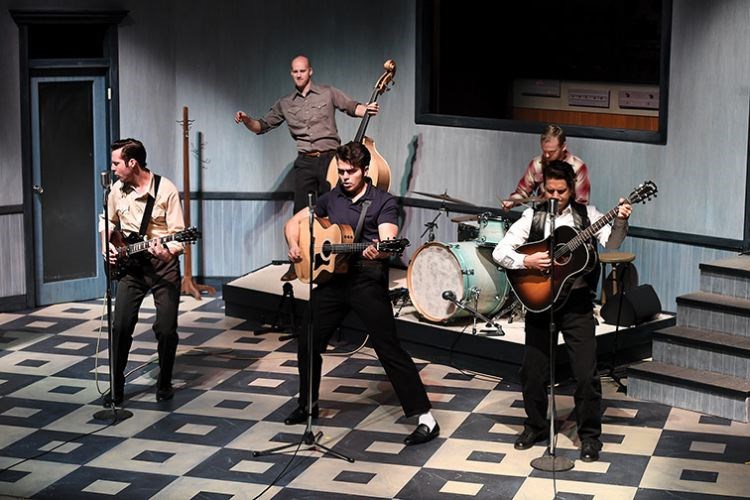There's whole lotta shakin' going on at Theatre Northwest.
That's where Million Dollar Quartet, based on the true story about the convergence of four popular music legends for what has been regarded as a seminal moment in rock and roll, started its run on Thursday night.
On December 4, 1956, none other than Elvis Presley, Jerry Lee Lewis, Carl Perkins and Johnny Cash somehow simultaneously materialized at Sun Record Studios in Memphis, Tennessee. The get-together seemed to happen by pure chance - their only common thread being that they either were or - in the case of Presley - had been under contract to impresario Sam Phillips.
What followed was an impromptu jam session, immortalized when the Memphis Press-Scimitar (what a great name) ran a story the next day under the headline "Million Dollar Quartet."
Frankie Cottrell, Montgomery Bjornson, Edward Murphy and Kenton Klassen take on the daunting tasks of playing Presley, Lewis, Perkins and Cash respectively. It means not only portraying a foursome of well-known characters but playing their songs.
In other words, the question for me was not so much whether they have acting chops but had their chords down. They answered that one right out of the gate with a rousing rendition of Blue Suede Shoes.
The tone was set, and over the next two hours, a further 23 rollicking, rambunctious tunes were belted out, interspersed with soliloquies from Phillips, as played by David Sklar, and exchanges of barbs, jibes and jokes between all who were on the stage.
The drama, such as it is, largely revolves around whether Phillips should follow Presley, who had moved on to RCA, or stay at Sun and continue to give up and coming talent their chance to shine.
Side plots include some friction between a fading Perkins and the suddenly iconic Presley over the latter's choice of recording Blue Suede Shoes. It was Perkins who first wrote and performed the song but it became synonymous with Presley, much to the former's chagrin.
Added to that is the friction between Lewis and just about everybody. Impetuous and over-the-top, Lewis was immensely talented, matched only by his ability to annoy it seems. With a goofy smile and wild hair Bjornson plays the role to strong comedic effect, coming across as the kid at the back of the class as he fidgets behind his piano off to the side of the stage.
According to the historians, Presley pretty much led the jam session (they actually sang gospel songs not timeless hits on that day) but in the stage version, Perkins, as played by Murphy, is the front man.
Frustrated and bitter over an inability to produce another hit, his character spends much of his time lashing out. Murphy brings it home when he takes to his guitar and mic and shows just how talented Perkins was - a positive testimony to both of their abilities..
Arguably, as Presley and Cash, Cottrell and Klassen are taking on the toughest tasks. As they channel the two household names, they both ably to take on the looks and personalities but sensibly avoid outright mimicry, relying largely on their own abilities behind the mic to do justice to their songs.
A nice addition is Ferris Vasko, who plays Presley's girlfriend. Well-coifed in a high-end '50's hairdo with a dress to match, she gives a gentle break from the testosterone and is arguably the best singer of the bunch.
As Phillips, Sklar plays a hard-driving businessman who also happens to have a passion for nurturing musical talent. "I just want my boys to be happy," he says at one point, a frown effectively tattooed on his face.
The set, a recording studio obviously, is testimony to the era of oversized microphones, muted colours, tape-to-tape recording systems and discretely-placed whiskey flasks. As the backup musicians, Curtis Abriel ably plays an eye-catching standup base and Daniel Bell gets his moment to shine with a brief drum solo near the end of the show.
There were glitches on opening night. Lines were stumbled over a couple times and leadenly delivered a few other occasions. And at one point the bells and whistles seemed to drown out the singing although that appeared to be remedied later on - or maybe my ears finally adjusted. But those are just minor criticisms.
Overall, Million Dollar Quartet is an energetic tribute to an era and its music. It is well worth seeing - and hearing.



